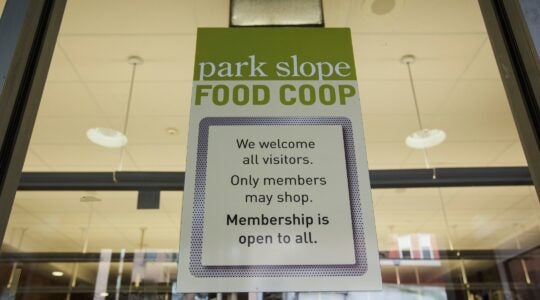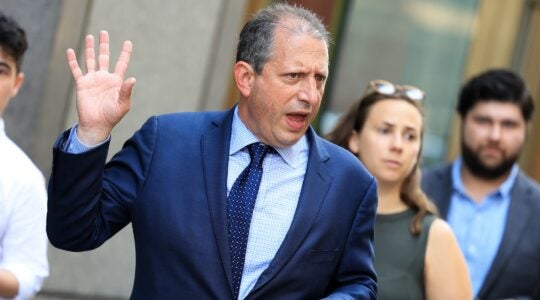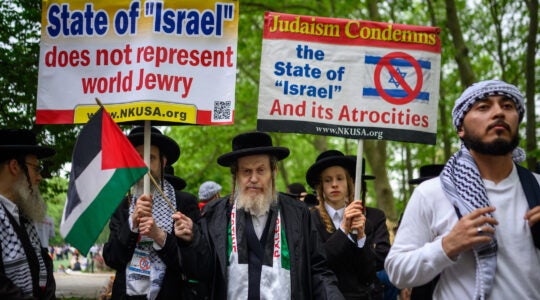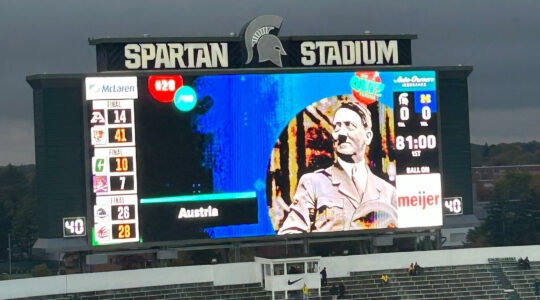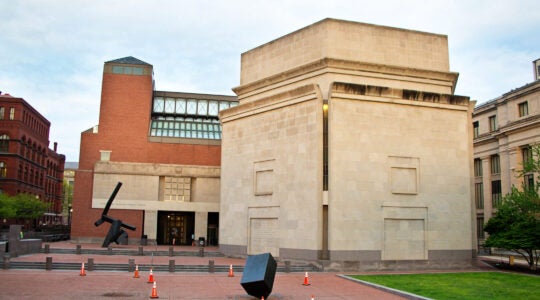Ed Koch died Friday, Feb. 1, 2013, the day a documentary about his life premiered in New York City.
As JTA’s Uriel Heilman and Ron Kampeas note in their obituary of the former mayor, Koch wasn’t shy about being Jewish or sticking up for Israel and other Jewish causes — and that’s how he wanted to be remembered :
Koch’s tombstone is engraved with his name, his years as mayor, the Shema prayer, and the final words of Daniel Pearl, the Wall Street Journal reporter murdered in Pakistan on Feb. 1, 2002, the same date Koch died: "My father is Jewish. My mother is Jewish. I am Jewish."
Koch’s advocacy on Jewish issues started before his three terms as mayor, from 1977 to 1989. Below are excerpts of JTA’s coverage of Koch’s early political career:
[[READMORE]]
- 1969 As a member of the House of Representative, Koch is part of a delegation that meets with Golda Meir in New York.
- 1971 In March, Koch introduces a bill to allot 30,000 visas for Soviet Jews. In October, after lobbying and participating in rallies on behalf of Soviet Jewry, Koch withdraws his bill after Mitchell removes the quota.
- 1972 Koch asks President Nixon to protest the U.N. Security Council over the treatment of Syrian Jews. In October — one month after the murder of Israeli athletes at Munich and amid frozen diplomatic relations over the Six-Day War and a Jewish American held there for espionage — the United States informs Syria that it will make visas available to Jews with relatives in the United States. Koch continues to rally for the cause.
- 1974 In November, Koch protests against the U.S. decision to grant visas to PLO representative. In an unrelated development the following month, Koch alleges underworld ties at a nursing and old age home owned by New York Rabbi Bernard Bergman. The accused served eight months of a one-year prison sentence before his death in 1984.
- 1975 Koch advocates for kosher food in a federal prison where JDL leader Meir Kahane is due to serve time. Later that year, Koch raps the International Lawn Tennis Federation for scheduling the U.S. Open on Rosh Hashanah.
- 1977 Koch threatens impeachment proceedings against Federal Trade Commissioner Paul Rand Dixon for calling consumer advocate Ralph Nader, who is of Lebanese descent, a “dirty Arab” and a son-of-a-bitch” at a business meeting. "Assume for a moment." Koch said, "that he (Dixon) had referred to some other individual as a ‘dirty Christian’ or ‘dirty Jew.’ Is there any question but that there would have been an uproar in this Chamber?" Dixon apologizes. Two weeks later, Koch complains to federally funded Radio Liberty, which broadcasts to the Soviet Union, for buying scripts from an alleged Nazi war criminal, Vilis Hazners. In 1980, Hosners was among those profiled in an ABC news documentary about war criminals living in America.
And then he was mayor:
- 1977 Koch becomes the second Jew in a row to be elected mayor of New York.
- 1978 In early May, Koch makes Israel’s new prime minister, Menachem Begin, an honorary citizen of New York, and a few months later his administration earns praise for backing a law that prohibits the city from business dealings with companies or contractors that participate in the Arab boycott. Koch also receives some knocks from Jewish groups: The president of the American Jewish Committee asserts that Koch’s actions are leading to "a rise in anti-Semitism" among blacks in New York City and that "blacks have a right to feel aggrieved." And Chabad leaders have their own complaints, objecting when Koch ends special patrols in front of the movement’s headquarters and boycotting a meeting on the grounds that mayor is not concerned enough about the Jews in Crown Heights.
- 1979 Koch lobbies a presidential commission to erect a Holocaust memorial in New York, declares a Jewish Heritage Week and names a plaza in midtown Manhattan the Golda Meir Memorial Square.
- 1980 The mayor accuses administration officials of pushing President Carter into an anti-Israel position, but ends up appearing in television commercials for Carter in his primary battle against Ted Kennedy. Following the bombing of a synagogue in Paris, accuses French President Valery Giscard d’Estaing of "delivering Jews to the PLO," but later softens his criticism. During his visit to New York, Pope John Paul II sends Koch and other Jewish leaders a special message. In October, he declares a "Jabotinsky Dhttp://admin.jta.org/panel/index.php?S=0&C=edit&M=edit_entry&weblog_id=26&entry_id=3118511ay."
- 1981 Koch starts the year by concluding a visit to Israel and announcing that he now is a supporter of Israeli settlement policy. Later int he year he gives a key to the city to former Soviet refusenik Yosef Mendelevich. He slams the Reagan administration’s effort to sell AWACS to Saudi Arabia, hosts a reception for Anwar Sadat, sends happy 100th birthday message to Rabbi Modechai Kaplan and orders police protection for the visiting Belzer Rebbe over threats that a feud with Satmar hasidim could turn violent.
- 1982 Koch takes on the Met and the U.N. over Israel, and called the Soviet Union a "monstrous, barbaric state now engaged in cultural genocide against the Jewish people."
- 1983 Jewish notables, including Koch, meet with the mayor of Paris to express concern over anti-Semitism in France. Koch accuses President Reagan of backing away from his support of Israeli positions on Jerualem and settlements.
- 1984 Koch feuds with Kahane, clashes with haredim over gay rights, says a Reagan reelection will mean Casper Weinberger giving "tsouris" to Israel, and gets called "The Jew Koch" by a German-language paper.
- 1985 Koch leads black-Jewish coalition protesting the Rev. Louis Farrakhan, calls on U.S. to hit Egypt with sanctions and cancels a trip to India over its support of Yasser Arafat.
- 1986 Koch hosts Natan Sharansky, cracks a Waldheim joke, signs a bill naming street after David Ben-Gurion, and tells Israeli officials to warm up to New York Roman Catholic Archbship John Cardinal O’Connor.
- 1987 Koch reflects on visit to Warsaw and Auschwitz, boycotts mayors’ conference over Jerusalem snub and speaks at the massive rally for Soviet Jewry in Washington.
- 1988 Jews would be "crazy" to vote for Jesse Jackson, Koch says leading up to New York’s Demoractic presidential primary. After the primary, Koch apologizes to black leaders for getting "carried away," but in the summer warns against the possibility of Jackson becoming the U.S. representative to the United Nations. Soon after, Koch and Jackson shake hands and promise to work together.
- 1989 Comedian Jackie Mason denies that his comments about David Dinkins were racist, noting that he also picks on Koch. Dinkins defeats Koch in the Democratic primary, with a pre-election poll showing Koch winning the Jewish vote by a 3-2 margin.
It quickly became clear that while Koch’s career as an office-holder might be over, he had plenty of years ahead as a Jewish activist. Back to Heilman and Kampeas:
One of the proudest moments of Ed Koch’s life came during a trip to Israel in 1990, in the midst of the first Palestinian intifada.
Koch had recently left City Hall after 12 years as mayor of New York City and was touring Jerusalem when a Palestinian threw a rock at his group, striking Koch in the head. The ex-mayor was bleeding a bit but wasn’t really hurt, and he mopped up the wound with his handkerchief.
The incident would become one of Koch’s favorite stories, the moment, he would say, when “I shed a little blood for the people of Israel.”
Click here to read the JTA’s original account of the stone-throwing incident. For more on Koch’s post-politics activism, search the JTA Archive.
JTA has documented Jewish history in real-time for over a century. Keep our journalism strong by joining us in supporting independent, award-winning reporting.

